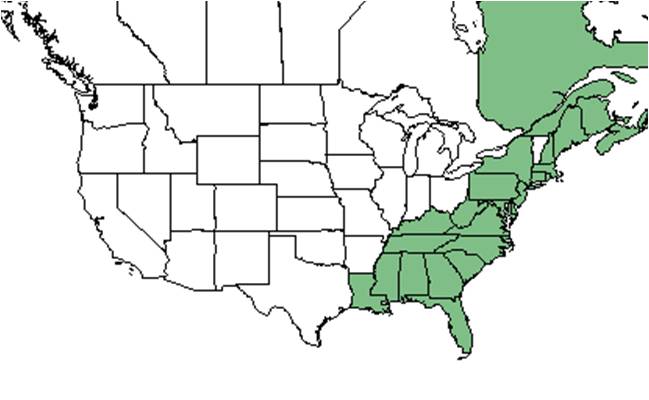Difference between revisions of "Gaylussacia dumosa"
(→Description) |
|||
| Line 17: | Line 17: | ||
| range_map_caption = Natural range of ''Gaylussacia dumosa'' from USDA NRCS [http://www.plants.usda.gov Plants Database]. | | range_map_caption = Natural range of ''Gaylussacia dumosa'' from USDA NRCS [http://www.plants.usda.gov Plants Database]. | ||
}} | }} | ||
| + | |||
| + | Common name: dwarf huckleberry | ||
==Description== | ==Description== | ||
<!-- Basic life history facts such as annual/perrenial, monoecious/dioecious, root morphology, seed type, etc. --> | <!-- Basic life history facts such as annual/perrenial, monoecious/dioecious, root morphology, seed type, etc. --> | ||
| − | |||
==Distribution== | ==Distribution== | ||
| Line 30: | Line 31: | ||
===Fire ecology=== <!--Fire tolerance, fire dependence, adaptive fire responses--> | ===Fire ecology=== <!--Fire tolerance, fire dependence, adaptive fire responses--> | ||
===Pollination=== | ===Pollination=== | ||
| − | + | The following Hymenoptera families and species were observed visiting flowers of ''Gaylussacia dumosa'' at Archbold Biological Station (Deyrup 2015): | |
| − | Apidae: Apis mellifera | + | Apidae: ''Apis mellifera, Bombus impatiens'' |
| − | + | Halictidae: ''Augochlorella aurata, A. gratiosa'' | |
| − | + | Megachilidae: ''Megachile brevis pseudobrevis, M. integrella'' | |
| − | |||
| − | |||
| − | |||
| − | Megachilidae: Megachile brevis pseudobrevis | ||
| − | |||
| − | |||
===Use by animals=== <!--Herbivory, granivory, insect hosting, etc.--> | ===Use by animals=== <!--Herbivory, granivory, insect hosting, etc.--> | ||
| Line 51: | Line 46: | ||
==Photo Gallery== | ==Photo Gallery== | ||
==References and notes== | ==References and notes== | ||
| + | Deyrup, M.A. and N.D. 2015. Database of observations of Hymenoptera visitations to flowers of plants on Archbold Biological Station, Florida, USA. | ||
| + | |||
Ostertag, T.E., and K.M. Robertson. 2007. A comparison of native versus old-field vegetation in upland pinelands managed with frequent fire, South Georgia, USA. Pages 109–120 in R.E. Masters and K.E.M. Galley (eds.). Proceedings of the 23rd Tall Timbers Fire Ecology Conference: Fire in Grassland and Shrubland Ecosystems. | Ostertag, T.E., and K.M. Robertson. 2007. A comparison of native versus old-field vegetation in upland pinelands managed with frequent fire, South Georgia, USA. Pages 109–120 in R.E. Masters and K.E.M. Galley (eds.). Proceedings of the 23rd Tall Timbers Fire Ecology Conference: Fire in Grassland and Shrubland Ecosystems. | ||
Revision as of 15:40, 6 August 2015
| Gaylussacia dumosa | |
|---|---|
Error creating thumbnail: Unable to save thumbnail to destination
| |
| Scientific classification | |
| Kingdom: | Plantae |
| Division: | Magnoliophyta - Flowering plants |
| Class: | Magnoliopsida - Dicotyledons |
| Order: | Ericales |
| Family: | Ericaceae |
| Genus: | Gaylussacia |
| Species: | G. dumosa |
| Binomial name | |
| Gaylussacia dumosa (Andrews) Torr. & A. Gray | |

| |
| Natural range of Gaylussacia dumosa from USDA NRCS Plants Database. | |
Common name: dwarf huckleberry
Contents
Description
Distribution
Ecology
Habitat
Gaylussacia dumosa is restricted to native groundcover with a statistical affinity in upland pinelands of South Georgia (Ostertag and Robertson 2007).
Phenology
Seed dispersal
Seed bank and germination
Fire ecology
Pollination
The following Hymenoptera families and species were observed visiting flowers of Gaylussacia dumosa at Archbold Biological Station (Deyrup 2015):
Apidae: Apis mellifera, Bombus impatiens
Halictidae: Augochlorella aurata, A. gratiosa
Megachilidae: Megachile brevis pseudobrevis, M. integrella
Use by animals
Diseases and parasites
Conservation and Management
Cultivation and restoration
Photo Gallery
References and notes
Deyrup, M.A. and N.D. 2015. Database of observations of Hymenoptera visitations to flowers of plants on Archbold Biological Station, Florida, USA.
Ostertag, T.E., and K.M. Robertson. 2007. A comparison of native versus old-field vegetation in upland pinelands managed with frequent fire, South Georgia, USA. Pages 109–120 in R.E. Masters and K.E.M. Galley (eds.). Proceedings of the 23rd Tall Timbers Fire Ecology Conference: Fire in Grassland and Shrubland Ecosystems.